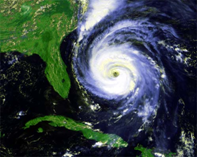 Mary Campbell, Pinellas County Extension Director, Urban Sustainability Agent
Mary Campbell, Pinellas County Extension Director, Urban Sustainability Agent
Hurricanes are on everyone’s minds in Florida right now. Since 1995, Florida has experienced some of the most active and intense hurricanes. There are reports that indicate climate change or global warming may play a role in the number and strength of hurricanes. Meteorologists use the term “tropical cyclone” for a closed atmospheric circulation that forms over a tropical or subtropical ocean. Once maximum sustained wind speed exceeds 74 miles per hour these storms are called hurricanes in the Atlantic Ocean, typhoons in the Pacific Ocean, and cyclones elsewhere. Let’s review what we know to date about the link between storms and climate change.
Sea level is rising and will continue to rise as oceans warm and glaciers melt. Rising sea level means higher storm surges, even from relatively minor storms, which increases coastal flooding and subsequent storm damage.
With rapid population growth in coastal regions placing many more people and structures in the path of these tropical cyclones, there is a much greater risk of casualties, property damage, and financial hardship when these storms make landfall.
Two factors that contribute to more intense tropical cyclones — ocean heat content and water vapor — have both increased over the past several decades. Human activities such as the burning of fossil fuels and the clearing of forests have very likely elevated carbon dioxide (CO2) levels in the atmosphere which contributes to global warming and these two factors.
The link between stronger hurricanes and global warming is a theory and is not a conclusion of the Intergovernmental Panel on Climate Change (IPCC). It is reasonable to theorize that some human contribution is responsible for the increase in strong hurricanes in the Atlantic since 1970, since this increase does correlate so well with the observed increase in sea surface temperatures. However, it is difficult to make a strong statement saying that global warming is responsible for stronger hurricanes, due to the high natural variability of these storms and the poor observational record.
There are no definite conclusions on the link between storms and climate change. Climate change is an evolving theory that will be the focus of scientists for many years to come. Preparation for storms is an important process for everyone living in Florida.
Intergovernmental Panel on Climate Change http://www.ipcc.ch/
Hurricane Season: Be Prepared http://pinellas.ifas.ufl.edu/hurricanes.shtml
 0
0
